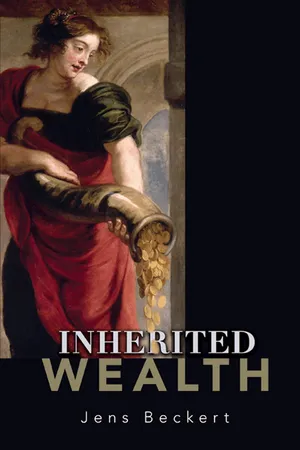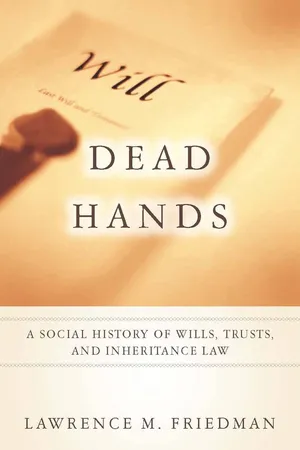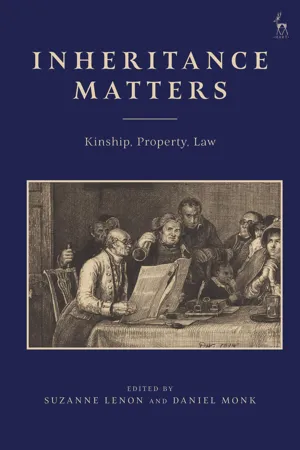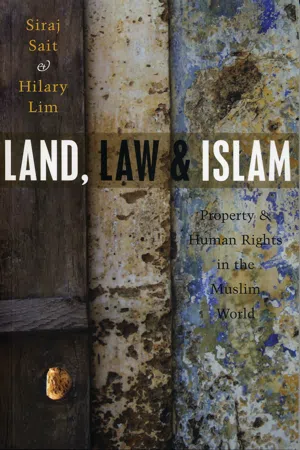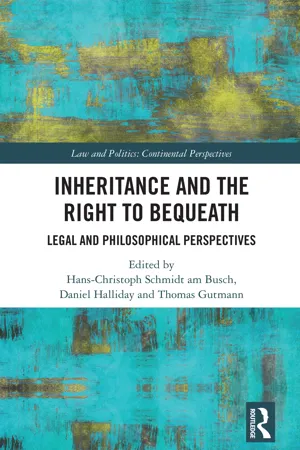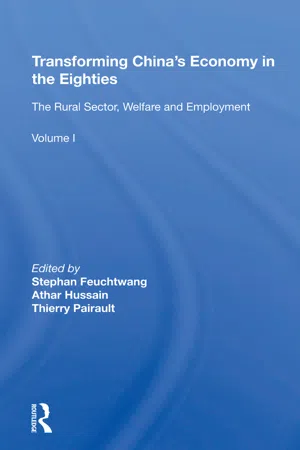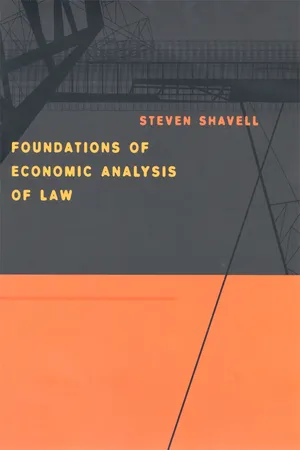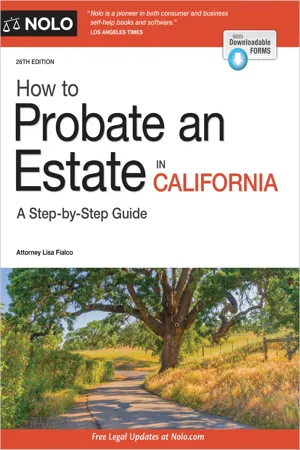Law
Inheritance laws
Inheritance laws govern the distribution of a person's property and assets after their death. These laws dictate who is entitled to inherit the deceased person's estate and in what proportions. They also address issues such as wills, trusts, and intestacy (when a person dies without a will).
Written by Perlego with AI-assistance
Related key terms
1 of 5
9 Key excerpts on "Inheritance laws"
- eBook - PDF
- Jens Beckert, Thomas Dunlap, Thomas Dunlap, Thomas R. Dunlap(Authors)
- 2018(Publication Date)
- Princeton University Press(Publisher)
To that extent, intestacy law expresses the prevailing social norms about the transfer of wealth by legacy, and, con- versely, it can be taken as an indicator for the structure of normative rules about the bequest of wealth. A first important stipulation of statutory inheritance law is that in all three countries in question, family members of the decedent are installed as heirs, not the state or charitable institutions. 4 This can be seen, at least in a weak sense, as the extension of a conception of property oriented toward the family (see Durkheim 1992, 174)—in a weak sense, because the testator can depart in his or her will from statutory inheritance law, and it is only the limitations on testamentary freedom examined in the previous chapter that secure the claim of family members to the estate. However, the exist- ence of intestacy law and its orientation toward the family clearly points to the fact that the testator is embedded within a regulatory structure that binds him normatively to the family. In addition, intestacy law contains precise information on a society’s normative ideas about the structure of kinship relations. 5 For the rules of distribution codified in statutory inheritance law and in inheritance taxation law also represent classificatory systems of kinship. Kin classifications, of the kind ethnology studies especially in traditional societies, are “a system of ideas, norms, and behaviors that serve to establish systems of solidarity” (Müller 1983, 165). An analysis of the development of statutory inheritance law therefore provides insight into changing claims of solidarity, definitions of social belonging, and the primary social purposes that are connected with the transmission of property. - eBook - ePub
Dead Hands
A Social History of Wills, Trusts, and Inheritance Law
- Lawrence M. Friedman(Author)
- 2009(Publication Date)
- Stanford Law Books(Publisher)
intestacy laws. These are rules—laws—that specify who inherits if the deceased dies without leaving behind a valid will. These rules differ from place to place in many details and have changed a lot over the years. But the general idea is everywhere the same: close relatives are preferred over those who are not so close. In no state today would the law favor your Aunt Minnie over your son or your mother. The system also prefers descendants to ancestors: your mother’s right to inherit would usually be trumped by your daughter’s. We also take it for granted that a person’s relatives on both sides of the family are equally entitled to a share. No American state prefers a mother’s brother to a father’s brother, or vice versa; this equality is the essence of the American kinship system. Many societies—in Africa, for example—have different traditions and laws.By definition, intestacy laws apply to people who do not leave behind a will. But even those who do are subject to some restrictions. In almost all of the American states it is not possible (or at least not easy) to cut a wife or husband off entirely.3 But for the most part, property owners in the United States enjoy the privilege of the fourth way, which we call freedom of testation . This is the dead hand’s right to decide how property will be handled after a person dies. This is, in theory, the basic principle of American law, and of common law systems in general (a little less so in civil law countries). But the law does require a certain amount of formality—execution of a will, or some equivalent. There are also some limits and restrictions on freedom of testation, which I will deal with in due course.As this brief discussion makes clear, the American system is a mixture of various ways of distributing property at death. Strictly speaking, nothing you “own” is up for grabs; but this simply follows from the way society defines ownership. Succession taxes, the intestacy laws, and freedom of testation are all real aspects of our law of succession. But the mixture of the various elements, and the ways in which they relate to the social context, vary over time and space, and are the main subject of this book. - eBook - ePub
Inheritance Matters
Kinship, Property, Law
- Suzanne Lenon, Daniel Monk, Suzanne Lenon, Daniel Monk(Authors)
- 2023(Publication Date)
- Hart Publishing(Publisher)
refusing an inheritance. In thinking of inheritance as foundational, we assert that these legal processes are premised on and legitimised by ways of imagining and thinking about intimate and civic relationships. The formal practices of inheritance law such as writing wills and determining intestacy division describes, codifies, reproduces, and potentially transforms the contours of family and kinship by way of property, perhaps best captured in colloquial phrases such as ‘family money’ and ‘dead hands’. Such terms gesture to the intimacies of the social world we inherit and thus to the sociality of inheritance itself: we inherit broader social conditions that are often understood as ‘natural’.The relationships between parents and children is of course key here, and perhaps the one that most frequently comes to people’s minds when thinking about inheritance. Generationality is almost implicit in the expression ‘passing on’, with its evocative mixture of physical and material associations. But examining Inheritance laws and practices challenges essentialist assumptions: there is nothing ‘natural’ about laws’ imagination of this relationship. A cursory look immediately brings to the fore the contrasting emphasis in civil and common law traditions between parental obligations and rights, respectively. And not far beneath the surface one comes up against the discriminatory concepts of ‘primogeniture’ and ‘illegitimacy’. Both haunt inheritance law. Reactions against the former were fundamental to the new social orders established after the French Revolution and the US War of Independence. The legacies of the latter are fundamental to the privileging of the marital and the – often religion-inspired – policing of gender roles, sexuality and indeed the institution, if not always the lived experience, of The Family. - eBook - PDF
- Clifton D. Bryant(Author)
- 2003(Publication Date)
- SAGE Publications, Inc(Publisher)
T HE DISPOSITION OF P ROPERTY Transfers Between the Dead and the Living ROBERT K. MILLER, JR JEFFREY P. ROSENFELD STEPHEN J. MCNAMEE A central fact of social life is that individual people die but societies live on, as does whateve r personal property individuals have managed to accumulate ove r their lifetimes . Because death is inevitable, societies establish formal and informal rules for the disposition of accumulated property at death. Th e rules of inheritance constitute a comple x and variable social, economic , and political process that links generations and provides the foundation for social o r g a n i z a t i o n al continuity . Inheritance is an integral componen t of family , economic , and legal institutions. Inheritance practices a re also a basic componen t of stratification system s and the i n t e r g e n e r a- tional transfer of economic , political, and social resources. Clearly, there is considerable cultural and historical varia- tion in the specific patterns of inheritance wit h respect to (a) what is t r a n s f e r r e d, including the form s of economi c wealth and political and social resources; (b) amounts t r a n s f e r r e d; (c) the mechanism s and timin g of transfers (inter vivos vs . testamentary transfers); and (d) the identity of heirs, p r o p o r t i o n a l i ty of distributions, and r a t i o n a l es for both. Inheritance varies intersocietally by mod e of production and level of technology and is essentially absent in non- stratified societies. In hunting and gathering societies, pro- ductiv e technology is simpl e and little or no surplus is produced. Nature is a giant storehouse, equally accessible to all, and there is really no need or ability to accumulate more than that required for immediat e needs. Under such conditions, the living accumulate little property and thus have little to bequeath. - eBook - ePub
Land, Law and Islam
Property and Human Rights in the Muslim World
- Hilary Lim(Author)
- 2013(Publication Date)
- Zed Books(Publisher)
5 Inheritance laws and Systems Any person contemplating death and considering the future distribution of his or her property will place in the balance a whole range of factors, which will be specific to his or her personal, family and social circumstances…. In Muslim societies, a person’s ability to make such calculations is frustrated, in theory, by the compulsory Islamic inheritance rules that impose substantial constraints upon the freedom of a person … to determine the devolution of his property. (Powers 1999 : 1167) Inheritance is often treated as marginal to general debates and policy formation concerning land rights, security of tenure and land reform. However, inheritance is one of the commonest ways of acquiring land or access to land, particularly in the Muslim world. In Muslim societies generally, irrespective of the specific faith of the Muslims concerned, inheritance rules are derived from religious sources for the division of an individual’s property upon death. Islamic inheritance rules are deeply embedded in popular consciousness and a source of pride because of their particularly close association with the Qur’an, surpassing in this perhaps any other area of law. The divinely revealed guidance (Qur’an 2: 180, 2: 240, 4: 7-9, 4: 11, 4: 12, 4: 19–33, 4: 176 and 5: 105–8) on inheritance is amongst the most detailed areas of Islamic law. This field of law has developed through interpretation by the various schools of Islamic jurisprudence over centuries, both Sunni and Shi’a - eBook - ePub
Inheritance and the Right to Bequeath
Legal and Philosophical Perspectives
- Hans-Christoph Schmidt am Busch, Daniel Halliday, Thomas Gutmann, Hans-Christoph Schmidt am Busch, Daniel Halliday, Thomas Gutmann(Authors)
- 2022(Publication Date)
- Routledge(Publisher)
actual relations and sanction abandonment and neglect do so from the perspective of the potential heirs rather than that of the testator (Foster 1998). In taking this stance, they ignore the many ways in which testators’ ability to reward those who actually cared for them in life is compromised by current inheritance law.In this chapter, I examine inheritance law from the perspective of the elderly and of Elder Law, and, in particular, through the prism of the theory I developed of Elder Law inspired by Family Law (Hacker 2020 ). Based on this prism and the normative and doctrinal works of others, as well as on two large-scale socio-legal studies I conducted on intergenerational transfers2 and other empirical data demonstrating the transformed characteristics and circumstances of old age, I join the few who argue that the focus of inheritance law should be reversed – to prioritize the care-related needs and wishes of the testator during old age (see, also, Tate 2008 - eBook - ePub
Transforming China's Economy In The Eighties
Vol. 1: The Rural Sector, Welfare And Employment
- Stephen Feuchtwang(Author)
- 2019(Publication Date)
- Routledge(Publisher)
7 China's New Inheritance Law: Some Preliminary ObservationsMichael PalmerThe study of the legal framework of inheritance may appear rather unexciting in comparison with some of the other contemporary developments in family law and social policy such as the single-child programme, freedom of divorce, adoption and the state's attempt to elevate the social status of the married-in son-in-law (Palmer, 1986a). Moreover, inheritance law might be regarded as occupying only an insignificant position in a socialist society which does not permit individuals to hold heritable proprietary rights in the principal means of production, agricultural land. However, describing China's law of inheritance in these terms seriously underestimates both the intrinsic importance of the corpus of legal rules governing this mode of property devolution and the light which the operation of the law can throw on domestic, kinship and other close interpersonal relationships.The inheritance of a number of important forms of property has been permitted throughout the period of socialist rule and the new inheritance law which came into effect on 1 October 1985 has recently expanded the range of heritable objects. In addition, it should always be remembered that inheritance is not only a mechanism for the redistribution of property but also a significant influence on the ways in which people conduct their interpersonal relationships. Inheritance in China normally occurs between close kin and, not surprisingly, ties between family members as well as wider kinship bonds are sometimes deeply affected by manoeuvres over inheritance matters. Potential beneficiaries may attempt to enhance their shares in an estate at the expense of other candidates. Testators may wish to reward or punish family members by increasing or limiting the inheritance shares of the various prospective heirs. The PRC's new inheritance law is intended not only to structure the manner in which some of the proprietary rights in material objects, including money, are passed down but also to provide clear and precise norms of property distribution which will assist in the resolution of domestic conflicts over inheritance rights. Accordingly, the present chapter attempts to lay out the main features of China's recently introduced law of inheritance and to examine some of the important social concomitants of this legislation. - eBook - PDF
- Steven Shavell(Author)
- 2009(Publication Date)
- Belknap Press(Publisher)
For example, a contract between a wife who does not work and a husband who does 60. See section 2 of Chapter 16 on donative contracts for further discussion. 61. To amplify, the rationale for such taxes cannot be solely to prevent a person from acquiring wealth. Were that the social goal, it would be best and most directly accomplished through a tax on wealth; there would be no need for an inheritance tax per se (and an inheritance tax would not prevent the living from accumulating excessive wealth); this type of argument is emphasized by Tullock 1971. The rationale for an inheritance tax must be that the retention of wealth by particular families across generations is deemed a social problem. 66 PROPERTY LAW might have stated that half of the family’s assets would be inherited by her if the husband predeceased her. 62 The donor’s inability to make a sound decision might also be suggested as a rationale for state control of bequests; in the late stages of life, an individual’s judgment is often impaired. It should be noted, however, that legal policies controlling inheritance can be partially circumvented by increases in inter vivos gifts. For example, were a law to require that half of a person’s property pass to the person’s spouse and children, the person could transfer much of his wealth to an alternative preferred donee during his life. The person would be unlikely to do this with all of his wealth, however: There must be some value to the person of retaining wealth until death, for he would otherwise already have given all of his wealth to the preferred donee. 8.9 The law. Individuals generally have great freedom to designate to whom their property will pass at death, but most countries stipulate that a decedent’s spouse (and sometimes his or her children) receive a minimum share, 63 and restrictions on inter vivos gifts are also frequently imposed to guarantee that these minimum shares will not have been diluted before testators die. - eBook - PDF
- Lisa Fialco(Author)
- 2023(Publication Date)
- NOLO(Publisher)
We provide simple definitions of the most important terms in the Glossary. Although the definition of “children” discussed above applies when determining heirs under the intestate succession laws as well as identifying beneficiaries of a will, the statute contains some special rules for intestate succession situations. A child who has been adopted may still inherit from his or her biological parents: • if the deceased parent was married to or cohabiting with the other biological parent at the time of the child’s conception and died before the child was born, or • if the adoption was by the spouse or domestic partner of either of the biological parents or took place after the death of either biological parent. Right of Representation and Gifts to Descendants The concept of inheritance by right of representation (or per stirpes) can be very important in determining whether particular people will inherit property under a will (and, sometimes, by intestate succession in the absence of a will) and if so, how much. “Right of Representation” Defined “Right of representation” means that the descendants of a deceased beneficiary take the same share collectively that the deceased beneficiary would have taken if living at the time of the decedent’s death. For instance, assume John makes a bequest to his brother Tommy, and Tommy dies before John but leaves three children of his own. Unless the will provided otherwise, Tommy’s children would take the bequest by right of representation—that is, Tommy’s children would equally divide Tommy’s bequest. When You Need to Understand Right of Representation and Other Distribution Options Fortunately, most people will not have to deal with this material at all. However, if you face one of the four situations set out just below, the concept of “right of representation” will apply.
Index pages curate the most relevant extracts from our library of academic textbooks. They’ve been created using an in-house natural language model (NLM), each adding context and meaning to key research topics.
